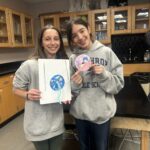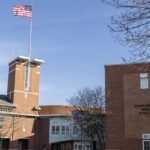Rabbi David Meyer – the former senior rabbi of Temple Emanu-El – visited the sixth grade class at Epstein Hillel School May 13 to talk about Jewish soldiers in the American Revolution. This was in conjunction with the sixth grade U.S. history curriculum.
Meyer is part of General John Glover’s Marblehead Regiment reenactment group, and in the reenactment, he represents the known Jewish soldier in that Regiment: Abraham Solomon, whose last name may have been spelled as Soloman. Solomon’s name is on the Marblehead Museum’s copy of a muster list, which recorded the men who had joined the regiment to ensure they were paid.
How do historians know Solomon was Jewish? Meyer explained that while most soldiers drew an X to sign their names, as they were illiterate, Solomon signed his name in cursive Hebrew.
“We believe this is the only Hebrew signature on a Revolutionary Era muster roll, and it’s kind of an unusual script. It’s like a Portuguese script, but you can see the aleph, and you can see the samech,” Meyer said. Aleph and samech are Hebrew letters.
“His handwriting is not really good, but whose is in cursive?” Meyer later joked.
Adorned in typical attire for a colonial soldier, Meyer first walked the students through how a musket safety check is performed. He did not bring any gunpowder with him onto school grounds, emphasizing this by showing the class his empty cartridge box, and he taught the students how to check to confirm this.
“I’m going to drop the rammer, that’s what this is, into the barrel,” Meyer told the sixth graders, “and if there’s no powder in the barrel, you’ll hear it ping. If there is powder in the barrel, it’ll be a thud, and we’ll have to take other precautions.”
Upon dropping his rammer, which is a metal or wooden rod that’s inserted into the barrel to push the gunpowder down into the barrel, some students called out: “That was a ping!”
Meyer then set the musket down on the students’ desks so everyone could take a turn to see it up close. One student immediately asked, “Why aim at me?” The classroom erupted in laughter because, frankly, the kid had a point. Meyer had set the musket down on the desks, and it was facing that boy. The musket was then promptly moved so it was not pointing at anyone, as Meyer told him, “Good point. Safety first!”
After his musket demonstration, Meyer said, “A lot of people don’t know that Jews fought in the Revolution.”
“A lot of people think that the Revolution was a product of Christian religious beliefs, but it’s really not the case,” he said. “Jews participated in the Revolution in accordance with our general numbers as a population at the time of the Revolution. Jews made up about half of 1% of the population… We believe there were 15 Jews who were officers, captains and lieutenants and colonels.”
He added that, “What makes the American Revolution different is you never had Jewish officers in any European army.” The European armies at the time, which Meyer pointed out, were all run by a King who was associated with a particular church, whether that be Greek Orthodox, Protestant Church, Church of England, Catholic Church, etc.
“In order to serve the crown and the military, you needed to be part of that church or answerable to it, which means you were not allowed unless you took an oath on the New Testament and swore your allegiances and belief in Jesus, which means you’re Christian” Meyer told the students. “That’s one of the reasons why Jews were so in favor of the revolution. You did have some Loyalists, those who liked the King and all that, but not many because in America, what made you a citizen was the way you behaved, not what you believed.
“(George) Washington didn’t care about if a soldier was Jewish or Christian or Muslim or nothing. He wanted people who were willing to fight for the cause.”
Meyer said, “As Jews, we were always part of the story of the founding of America, not as a Christian nation, but as one built on ethical values, civic engagement –meaning being a citizen – and taking part. Jews joined the Revolution because we could. We stepped forward toward citizenship by acting as citizens, and we got our religious rights because we acted like people who had rights.”
He added that specifically teaching Jewish youth about Solomon is important because “it’s a part of their identity formation, a sense of pride in who they are, where they come from – and a special story that they have here in this country.”





